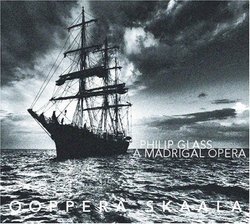| All Artists: Philip Glass Title: Glass: A Madrigal Opera Members Wishing: 2 Total Copies: 0 Label: Orange Mountain Music Release Date: 11/10/2009 Album Type: Import Genre: Classical Style: Opera & Classical Vocal Number of Discs: 1 SwapaCD Credits: 1 UPC: 801837006223 |
Search - Philip Glass :: Glass: A Madrigal Opera
 | Philip Glass Glass: A Madrigal Opera Genre: Classical
|
Larger Image |
CD Details |
CD ReviewsFinally Recorded! OgreOgress productions | 11/17/2009 (5 out of 5 stars) "Having performed "The State of the Tibetan Nation: A Madrigal Opera" many times with Christina Fong in the late 1990s, it is wonderful to finally hear this little-known but very important Glass work on disc. I wish that we had been allowed to record our version back in the late 1990s when we performed it on a regular basis for a 2-year period throughout the midwest and Canada (Canadian premiere at Open Ears Festival). This is some of the finest solo string writing of Glass's early career. One can hear the seeds of Koyaanisqatsi (in the solo viola movement) along with Glass's unique choral writing style, soon to be heard in Satyagraha." Musical Passion Marvin Cohodas | Vancouver, BC, Canada | 12/18/2009 (5 out of 5 stars) "Well, there's the title and there's the music. First the title. The Madrigal Opera is described by its composer as a chamber opera with an unspecified story line, allowing different narrative content to be inserted and thus making it potentially a different story each time it is performed. In this respect, it is more like a ballet than an opera. This is not surprising, since it is of the same period in the composer's career as Einstein on the Beach, which could also be described as more like a ballet than an opera. Now the music. The piece is scored for 6 voices with violin and viola. The format is one in which Glass has often worked and continues to do so. The opening and closing pieces, here called "opening" and "closing" as in Glassworks, are bookends to four central pieces, here called Parts I-IV. However, musically parts III and IV combine to create a structure somewhat parallel to parts I and II. The use of strings for accompaniment provide a clue that the music will be passionate. String writing seems to bring out the strongest, even delirious emotions in Glass' composition. Think of the string quartets, the third symphony with the sublime violin solo in the third movement, the obligato of the darkest song from Book of Longing (the heart-rending "Babylon"), or the breathtaking violin concerto number 1. And the Madrigal Opera doesn't disappoint in this regard. Errol Morris is known for saying that Glass "does existential dread better than anybody." I would add a paraphrase, relevant especially to parts 1 and 2 of the Madrigal Opera, that Glass does ecstasy better than anybody." YEAH! Eric Mars | San Francisco, CA | 12/10/2009 (5 out of 5 stars) "This truly IS an important Glass work. I'm elated!!! As the other reviewer says you can hear the seeds of Koyaanisqatsi (Pruit Igoe to be exact, but actually, more detailed, complex and emotional.) If you're a Glass devotee you're a bit jaded about new releases - so much repetition (ha ha). But this is truly glorious and different - it's not 'yet another soulless recording of Music in 14,257 parts' by any means. I would actually also have to put Naqoyqaatsi and EOTB Knee Play 5 in this family. It's PG without compromises and taking no prisoners. It's not decorative, it's not meant to prove you're smart. It's meant to move you. And it does. I give credit to the musicians - it's INCREDIBLY performed by musicians who truly understand the music. Very emotional. Not mechanical in the least. The non-initiated may hear squeaks on a chalkboard, those who understand. Will cry."
|

 Track Listings (6) - Disc #1
Track Listings (6) - Disc #1